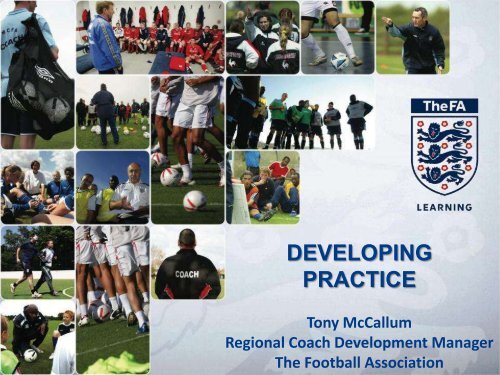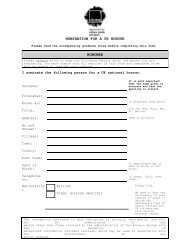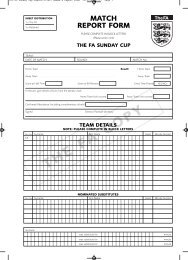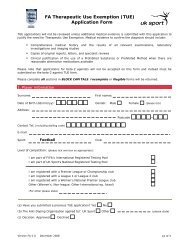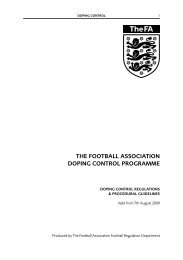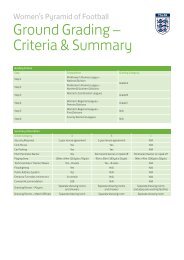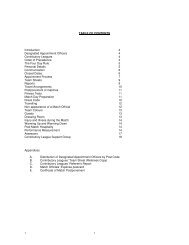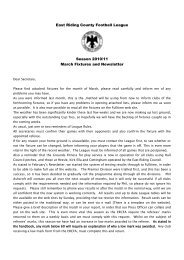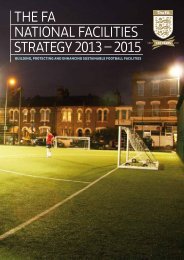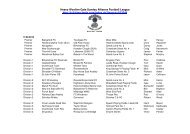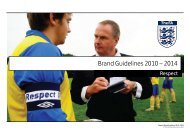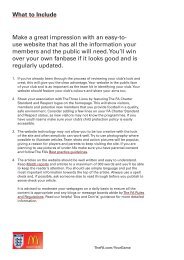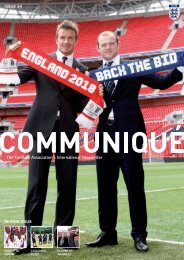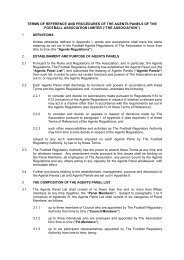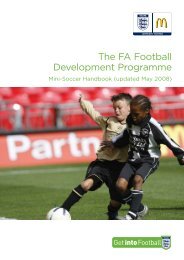DEVELOPING PRACTICE - The Football Association
DEVELOPING PRACTICE - The Football Association
DEVELOPING PRACTICE - The Football Association
Create successful ePaper yourself
Turn your PDF publications into a flip-book with our unique Google optimized e-Paper software.
<strong>DEVELOPING</strong><strong>PRACTICE</strong>Tony McCallumRegional Coach Development Manager<strong>The</strong> <strong>Football</strong> <strong>Association</strong>
Essential Coach UnderstandingGAMEENVIRONMENTPLAYERS<strong>PRACTICE</strong>‘In order to teach football to John –You have to know football but you alsoneed to know John!’
Practice.....‘its what I like to do or its what the players need’Practice is the act of rehearsing a behaviour overand over, or engaging in an activity again and again,for the purpose of improving or mastering it.Deliberate (Purposeful) practice lies in continuallypracticing a skill at more challenging levels with theintention of mastering it. It entails considerable,specific, and sustained efforts to do something youcan’t do well
Looking at your players...TechnicalPsychologicalPhysicalSocialWhat do they need to practice...?
As coaches what should we be lookingto achieve from practice....?A Practice Checklist Clear Learning Focus Repetition of the focus Realistic Relevant Challenging & Motivating Benefit to all Player ownership & Responsibility Enjoyable Simple & Organisedhow often, how long , how intense are the practices ?
‘You get what you practice’
BeginnerExpert
AdvancedBeginnerExpertIntermediateWhat may determine the stage your players areat, or can get to...?
• Age• Ability• Experience• Opportunity• Motivation & Drive• Economics• Socio/cultural• Luck• Others ?Opportunity + LuckMotivation & ‘Drive’Ability
Visualise - An absolute beginnerKnowledgeUnsure how, where and when to useskills or movementsUnsure what’s ‘next’Unsure of cues, triggers and patternsNot sure of Rules ?How they perform skillsFocus on the ball (head down)Hesitant or worried ?Slow or exaggeratedRash or slow Decision Making& Problem solvingPhysical‘Wooden’ looking – limbs move as ‘one’Use unnecessary muscles & jointsUn–coordinated, unbalancedNot efficient with movementMay tire quickly
Practice - Development of Neural PathwaysRepeated movements will be remembered by thebrain & stored as nerve impulses.<strong>The</strong> nerve impulses from the brain ‘tell’ themuscles and joints to move in that way.A Myelin Sheath is formed which increases thespeed of the nerve impulses and ‘insulates’ thefibres from one to the otherRepetition thickens this myelin sheath so themessages get a ‘fast pass’ to the muscles & jointsRepetition will eventually lead to these movementsbeing automatic as the brain stores them
‘Muscle Memory’Reinforcing movements throughrepetition, enables the neuralsystem to learn those actions to adegree where it not longer needs to‘think’ about them.Consider carefully what movementsplayers need to play the game
Visualise - An absolute beginnerKnowledgeUnsure how, where and when touse skills or movementsUnsure what’s ‘next’Unsure of cues, triggers andpatternsNot sure of Rules ?How they perform skillsFocus on the ball (head down)Hesitant or worried ?Slow or exaggeratedRash or slow Decision Making& Problem solvingPhysicalWooden’ looking – limbs move as ‘one’Use unnecessary muscles & jointsUn–coordinated, unbalancedNot efficient with movementMay tire quickly
Decision Making - Skill• <strong>The</strong> most important ‘factor’ for coaches?• Intrinsically linked to game understanding• <strong>The</strong> major reason for mistakes – trial & error• A major difference between good and excellent players• <strong>The</strong> key to good decision making is not knowledge - Itsunderstanding – when, where, how, why, who•Great players make decisions instinctively•But we still don’t practice it enough !!
<strong>The</strong> ability to anticipate & make decisions isdependent on perceptual & cognitive skills thatcontinuously interact during a practice or game –<strong>The</strong>se skills include the ability to :•Visually pick out relevant information•Recognize early information from posture & body shapeof an opponent or team-mate in the moments before a key eventsuch as foot to ball contact•Recognize familiarity in the playing patterns usedby opposing teams or individuals•Develop accurate expectations or probabilities of what ‘opponents’& team-mates’ are likely to do next
How to Improve Decision MakingPractices with varying : Positions, speeds, angles of Players Speed, height, angle, distances of the Ball Reduced amounts of Space & Time Player choices and challenges – matchedup/overloads/outnumbered situations Allowing players to experiment & learn through trial& error - Let players self correct More matches with variety of intensity, duration,size of pitch, player numbers, rules, etc.
Expert ? Experienced & TalentedVast ‘football memory’ -Efficient ‘predictor’‘Plays in the ‘future’Very informed Decision MakingDetect & correct own errorsMovements efficient automatic and smoothNeural pathways are super ‘highways’ of communication
‘<strong>Football</strong> Memory’A collection of ‘mental pictures’ based onexperience(s) which players instantly ‘recall’ tohelp them make decisions & solve problems in agame .
<strong>Football</strong> Practice – Giving the players ‘memories’MuscleMemory<strong>Football</strong>MemoryFond memoriesof the coach &football
A Practice Spectrum
A Practice ‘Spectrum’High(closer to the game)Wider focusWider returnsLow(Further from the game)Narrow focusSpecific returns
<strong>The</strong> ‘ Practice Pie’How are you going to ‘cut it up’ ?Which slice is going to be the biggest ?
Right Practice - Right Players - Right Time
Example Sessions – Receiving & Turning in MidfieldTechnique Practice1.In teams of 3 – pass into central area, receive,turn and pass out to team-mate3 x 4 groups - 4 balls2. Receive from outside, turn with and without atouch.3. Combine with team-mate inside the central areabefore playing out – target free to receive4. Combine in end zones before playing intocentral area. – midfield free to receive5. Rotate central players with end players –cue/trigger the change (turn/pass)Skill Practice1. 8 v 6 skill practice – 2 v 1 in end-zones andwide areas – 2 v 2 in central area2. Red team to complete one full cycle – endzoneto end-zone and back3. Blue team – win possession and score in goal4. Challenge - Play into midfield area on everypossession5. Players on outside can rotate in on cue/trigger6. Players on outside can join into midfield areato create 3 v 2 overload – risk?
Example Sessions – Receiving & Turning in MidfieldConditioned game Practice1.Two teams – 6 v 7 + GK’sTeams remain in allocated areas 2v1/3v4/2v12. Blue team can attack either end to scoreRed team possess the ball through the thirds andback to score3. . Combine with team-mate inside the centralarea before playing out – target free to receive4. Combine in end zones before playing intocentral area. – midfield free to receive5. Rotate central players with end players –cue/trigger the change (turn/pass)Small-sided Game – 9 v 9 Practice1. 9 v 9 game – teams deployed into thirds, 3-3-2 v 3-3-22. Players need to reference their area but not ‘locked in’3. Combine with team-mate inside the central area beforeplaying out – target free to receive4. Combine in end zones before playing into central area. –midfield free to receive5. Rotate central players with end players – cue/trigger thechange (turn/pass)
Example Sessions – Receiving & Turning in MidfieldPhase of Play Practice1.Two teams – complete units of midfield/attack (red) and defending/midfield (blue) – additional support players for both teams4 – 4 – 2 v 4 – 3 – 32. Red team – combine in midfield to play into attack and score Blue team- play out from the back into midfield and into target playerto score in either goal3. . Combine with team-mate inside the central area before playing attacking players4. Combine in defending areas before playing into central area – midfield free to receive
<strong>DEVELOPING</strong><strong>PRACTICE</strong>Tony McCallumRegional Coach Development Manager<strong>The</strong> <strong>Football</strong> <strong>Association</strong>Email – tony.mccallum@thefa.com


